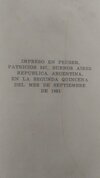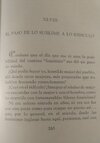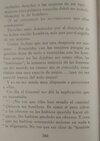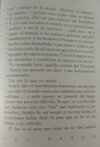The decree of necessity and urgency announced last night by President Javier Milei has already had its first legal challenge. The Civil Association Observatorio del Derecho a la Ciudad (Observatory of the Right to the City) filed a lawsuit before the federal contentious-administrative courts questioning the regulation. The economist Claudio Lozano, former national deputy, also signed the lawsuit.
The plaintiffs ask for a declaration of "the unconstitutionality and absolute and irrevocable nullity of the Necessity and Urgency Decree No. 70/2023″.
Once the case was resolved, it was the turn of the Federal Administrative Court No. 2, headed by Judge Esteban Furnari, who was asked as a precautionary measure to order the suspension of the effects and the validity of the DNU.
The Asociación Civil Observatorio del Derecho a la Ciudad is an organization that promoted several legal actions against measures of the government of Horacio Rodríguez Larreta in matters of mobility, metrobus, urban planning, public space, health and environment.
The lawyer sponsoring the lawsuit is Jonatan Baldiviezo, who in his LinkedIn account appears as an advisor to the Buenos Aires Legislature and was a candidate for the left.
In his X account (formerly Twitter) he published today that the decree of necessity and urgency is "the end of democracy" and that Milei is "a traitor to the homeland".
"Milei, traitor to the homeland, does not remove privileges from 1% but the rights of 99% of the population", he said and continued: "It is the beginning of the end of Argentine democracy or it is the beginning of the end of Milei's government...", he affirmed. And he said: "It is our duty to defend democracy".
The lawyer said that the DNU is "looting with the pretension of legality".
The lawsuit states that "the decree violates the principles of division of powers, the bicameralism established in our constitutional regime, the democratic principles and functional correctness that inform the entire constitutional text."
"This DNU is not intended to address the conjunctural and transitory solution of an emergency situation in exceptional circumstances, but to establish a new social and economic course for the country on a permanent basis," says the text of the amparo.
It further argues that "the scope of this package" is equivalent to affirming that "the Executive Branch has arrogated to itself extraordinary powers and powers equivalent to exercising the sum of public power."
It points out that the decree violates the constitutional requirements of the DNU, foreseen to "contain decisions of a conjunctural nature" to "alleviate an alleged exceptional situation" and "not to have the character of permanent norms modifying laws of the National Congress". This is established in precedents of the Supreme Court of Justice.
In addition, it points out that the Congress can function. "It is not the case that the challenged decree responds to an impossibility of passing the law through the ordinary procedure provided for in the Constitution. This is evident and irrefutable, since the Congress is functioning regularly," states the 60-page lawsuit.
"In addition, we are facing a mega DNU that, due to its massive scope (83 laws), is incompatible with the exceptionality required by the Constitution", the text questions. And it points out: "This omnibus DNU or mega DNU does not address an exceptional circumstance that makes it impossible, due to its urgency, to be dealt with by Congress".
Rather, what is intended is "the radical and structural modification of the model of human development, of economic progress with social justice, of productivity of the national economy and of economic growth of the country without waiting for Congress to evaluate the proposal and the radical new course that is proposed".
"The National Constitution -the amparo affirms- does not authorize that the Decrees of Necessity and Urgency be used for this purpose whose power substantially corresponds to the Congress of the Nation."
The judicial brief wonders what is the urgency to repeal the gondola law, to allow soccer clubs to become corporations, to eliminate fines for non-compliant employers, to modify the land law, to privatize Arsat, to repeal the Rent Law, ratified by Congress two months ago, to repeal the law regulating transitory rent, among other initiatives.
The procedure for this type of lawsuit includes giving notice to the opposing party and the judge analyzing whether or not it is appropriate to issue a precautionary measure, such as the suspension of the effectiveness and effect of the decree until a ruling on the merits is issued.
This claim, once resolved by the judge of first instance, may be appealed before the Federal Administrative Chamber and then before the Supreme Court of Justice, which will have the last word.
 Derogation of the Land Law: it will allow the sale and delivery of territory and resources to foreign powers.
Derogation of the Land Law: it will allow the sale and delivery of territory and resources to foreign powers. Derogation of the Industrial Promotion Law: it annihilates Tierra del Fuego. The province is on the verge of bankruptcy and depopulation, which favors British interests in Malvinas and Antarctica.
Derogation of the Industrial Promotion Law: it annihilates Tierra del Fuego. The province is on the verge of bankruptcy and depopulation, which favors British interests in Malvinas and Antarctica. Labor reform: confirmed the flexibilization in favor of corporate interests.
Labor reform: confirmed the flexibilization in favor of corporate interests. Derogation of the Supply, Gondolas and Buy Argentine laws: it favors the monopoly in domestic trade, eliminates the protection of small and medium sized companies.
Derogation of the Supply, Gondolas and Buy Argentine laws: it favors the monopoly in domestic trade, eliminates the protection of small and medium sized companies. Privatization of public enterprises: handing over technological and industrial resources to foreigners.
Privatization of public enterprises: handing over technological and industrial resources to foreigners. Enables massive imports and unlimited exports: bankrupts SMEs, drains domestic consumption.
Enables massive imports and unlimited exports: bankrupts SMEs, drains domestic consumption. Open skies policy: Elimination of Aerolíneas Argentinas to hand over our sovereignty over the skies.
Open skies policy: Elimination of Aerolíneas Argentinas to hand over our sovereignty over the skies.










